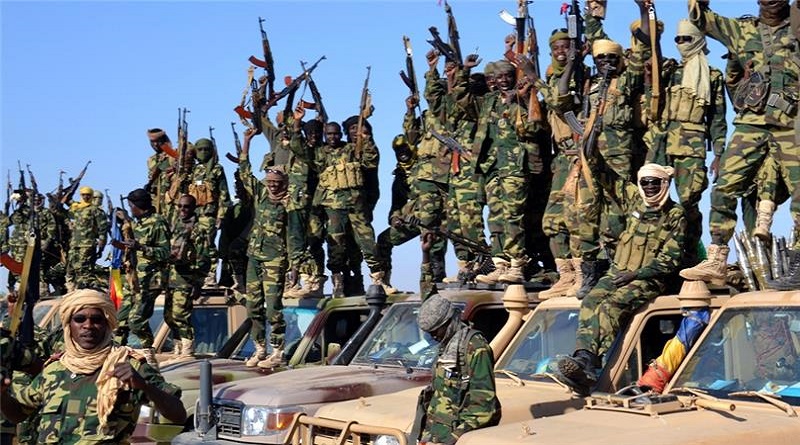
Boko Haram: A History of Murder, Kidnapping, and the Devalue of Human Rights
News & Politics October 17, 2015Boko Haram Starts at Nigeria, The History
The time is noon in a small town on the outskirts of Baga, Nigeria. Flecks of sun light spilled out onto winding fields, warm and inviting. A small dirt road twisted and turned breaking the evergreen pattern of grass and bush. Light purple flowers, lit by the light of the sun, smile back on passerby. Men and women, children and elderly; they all walk upon dirt roads that wind through small villages crafted from loose timber, long grass, and mud. A pungent smell of dirt and sweat permeate the air, but the breeze carried from a river that etched its way through the small village gave the people a much needed respite. These people tilled fields in their riddled garbs. Sweaty, muddied pieces of cloth hung loose from their heads, hoping to shield their eyes and skin from the ultraviolet rays.
The time is now one o’clock. Men and women peered down the dirt road where puffs of dirt signaled a vehicles approach. A yell was heard. A warning call to those in the fields to run back home, a very serious call. Soon, the vehicles were upon the village. Hum-V’s, pickups, and cars drove by; men dressed in green, tan, and brown camouflage waved large rifles, their ammunition draped over their necks and shoulders. Camouflage shirts wrapped around their heads and faces kept their features unknown. Menacing eyes peered out with authority as they scanned the fields and watched the men and women retreating. Dressed similar to the military of Nigeria, but not quite, Boko Haram terrorizes the landscape of Baga, Nigeria.
Kidnappings and killings define Abubakar Shekau’s leadership, and it has been estimated that the group has killed five-thousand civilians between July 2009 and June 2014. Estimated at three-thousand strong, Boko Haram has been designated a terrorist organization for their extremist views and values by most countries, including the United States and United Kingdom. The history of this group is shrouded in blood, kidnappings, and radical thought, and this Hub will dive into the world of Boko Haram.
Boko Haram, translated to “Western Education is Forbidden,” is an Islamic extremist group that was founded in Nigeria in 2002. The ex-leader of the group, Mohammed Yusuf limited activism to a few incidents up until 2009 where a new helmet law caused tension between the state and Boko Haram. Yusuf was captured and put to death in a battle that took place in Borno which gave way to the rise of Abubakar Shekau. Since his rise to leadership, attacks and fatalities have increased immensely, and, currently, the group has put pressure on the town of Baga. It has been estimated that two-thousand have been killed in this incident.
“I don’t know how many people have been killed,” Senator Maina Maaji Lawan, who represents Borno North, said to the BBC News. “But at least 70% of the area I represent is in Boko Haram hands.”
Back in April, 2014, Boko Haram assaulted a girls’ school in Chibok, Borno where they abducted an estimated three-hundred girls. This caused a lot of commotion among other nations where they sent support teams for aid. During this time, Boko Haram took their opportunity to attack and slaughter three-hundred civilians from the town Gamboru Ngala.
This incident marked the transition into extremely hostile tensions between Boko Haram and the state military. First Gamboru Ngala, now Baga.
“Every witness we speak to is fleeing for their life. They are not hanging around Baga to check exactly what’s happening so it is hard to be sure we are getting facts,” BBC News says.
In 2003 Boko Haram followers created the settlement, known today as Afghanistan, which created tension within the state. Local officials denounced the settlement and, after a series of attacks by Boko Haram, were forced to destroy the settlement. The Nigerian state has never been able to communicate with Boko Haram due to the extremist nature of the group and the ridiculous terms they require for a cease fire. Their ideology stems from a violent Sunni Jihadist teaching and it has been noted that the group was in affiliation with other extremists, such as al-Qa’ida. They believe that Nigeria has been conquered by “false Muslims” and aim to reconquer Nothern Nigeria so they can establish a “fundamentalist interpretation” of Sharia law1. Western education is scrutinized among the Boko Haram as well.
Boko Haram took over a military base in Baga and, with the continued assault on civilians, have crept to the third most deadly extremist group in the world. They fall short of number one to the two Taliban groups. With their acquisition of Baga, Boko Haram has been in the news for atrocities that range from mass killings to forcing women and children to conduct suicide bombings, and the government has said little on the issue.
“As Nigeria prepares for elections next month, accountability—or lack thereof—seems to be the most important campaign topic not being discussed by the candidates,” The Daily Beasts’s reporter Barbie Latza Nadeau says..
The lack of clear information by the government has led to a lot of angst in foreign relations. There has been no clear body count, no clear sign of action by the government, and no sign that Boko Haram will relent without the government seceding to their demands.
Boko Haram’s Deadliest Massacre
Boko Haram Updates:
Chadian helicopters bomb Boko Haram on Nigeria-Niger border: Niger army. Here.
Boko Haram swears allegiance to ISIS/ISIL. Here.
70 Bodies found in Nigerian Town, Boko Haram Crisi. Here.
Boko Haram militants killed in attack on Nigeria’s Bama. Here.
Voters Question Advance on Boko Haram. Here.
More history on Boko Haram. Here.
Header photo Source: AL Jazeera











